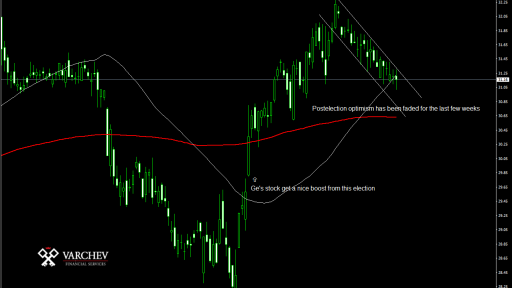- Home
- >
- Stocks Daily Forecasts
- >
- General Electric earnings: Here’s what to expect

General Electric earnings: Here’s what to expect

Shares have fallen by an average of 1% on the day of the past four quarterly reports
General Electric Co. is scheduled to release fourth-quarter results on Friday before the market opens, with the diversified industrial giant expected to report a decline in quarterly earnings for the first time in a year.
After a year chock-full of business divestiture announcements, with $193 billion in asset sales signed through the third quarter, GE said in October that its GE Capital exit plan is substantially complete.
GE GE, -1.79% which now bills itself as a “digital industrial company,” got the bulk of its profit in the previous quarter from its aviation and power businesses, while its renewable energy business provided the fastest year-over-year growth and its energy connections business declined the most.
With optimism over the potential benefits from President-elect Donald Trump’s pro-business policies already starting to fade, J.P. Morgan analyst C. Stephen Tusa said GE’s stock was the “top avoid” of the industrials he covered given “weak fundamentals” and with its free cash flow the “weakest” in the sector.
“With this backdrop, we see valuation as expensive…with limited incremental catalysts to change the narrative,” Tusa wrote in a recent note to clients.
Here’s what investors can expect from Friday’s report:
Earnings: GE is expected to report earnings excluding nonrecurring items of 46 cents a share for the quarter to Dec. 31, according to the average estimate of 17 analysts surveyed by FactSet. That is down from 52 cents a share in the same period a year ago, and down from consensus of 47 cents as of Sept. 30.
Estimize, a crowdsourcing platform that gathers estimates from Wall Street analysts, as well as buy-side analysts, hedge-fund managers, company executives, academics and others, has a consensus earnings-per-share estimate of 48 cents, based on 101 estimates.
GE has beat the FactSet EPS estimate the past six quarters, and in eight of the past nine quarters.
Revenue: The FactSet revenue consensus is $33.94 billion, which matches what GE reported for the same quarter last year. Those crowdsourced by Estimize are projecting, on average, revenue of $34.19 billion. As of Sept. 30, the FactSet consensus was $34.89 billion.
GE missed the FactSet revenue consensus in the previous quarter, and missed in nine of the past 11 quarters.
Stock price: GE’s stock has been trending lower since peaking at a five-month closing high of $32.25 on Dec. 20, giving back more than one-third of what it had gained in the six weeks after the election.
Through Thursday’s close, GE’s stock has climbed 6.1% since the election, underperforming the SPDR Industrial Select Sector exchange-traded fund XLI, +0.73% which has gained 9.0%, and the Dow Jones Industrial Average DJIA, -0.37% which has advanced 7.6%.
Investors may have good reason to be concerned ahead of the results, as the stock declined on the day that the past four quarterly reports were released by an average of about 1%.
Meanwhile, analysts remain mostly bullish on GE’s stock. The average rating of the analysts surveyed by FactSet was the equivalent of overweight, while the average stock price target of $33.81 was 8.3% above current prices.
Another areas of focus is likely to be orders. In the conference call after third-quarter results, GE CEO Jeff Immelt said that despite a slow-growth environment, he expected orders to strengthen during the fourth quarter versus a year ago, after rising 16% on a reported basis in the third quarter, but falling 6% on an organic basis.
Investors should also take note of any commentary on costs, after Immelt said he planned to “control our costs even tighter” as GE navigated the low-growth environment.
GE’s health care business may also come into focus, as J.P. Morgan’s Tusa said the uncertainties surrounding the fate of Obamacare after the election could have caused a pause in purchase decisions by customers.
The FactSet consensus for health care revenue is a rise to $5.20 billion from $4.97 billion a year ago.
Source: MarketWatch
 Varchev Traders
Varchev Traders Read more:
If you think, we can improve that section,
please comment. Your oppinion is imortant for us.











